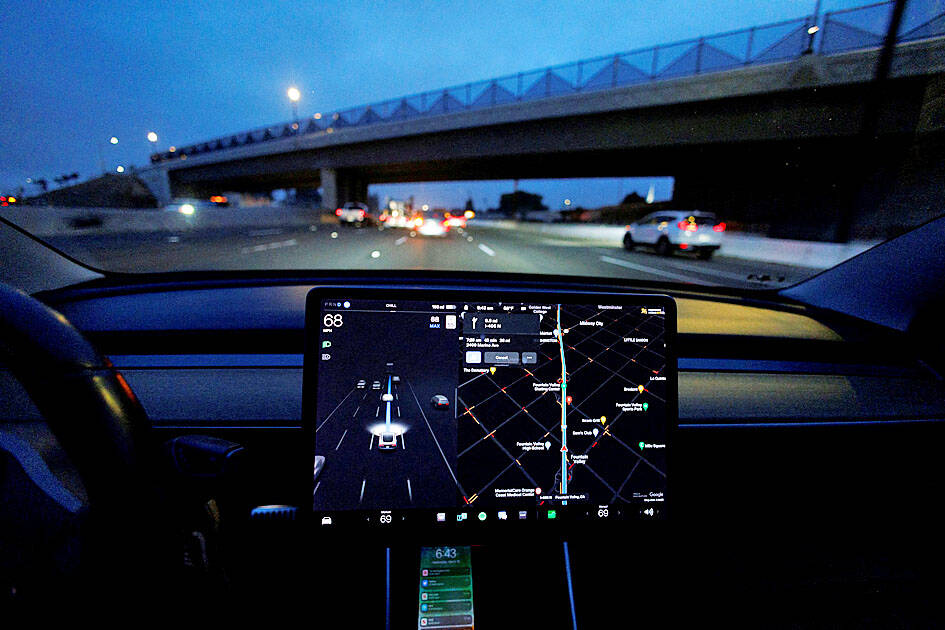The military would not buy any more Tesla vehicles following a suggestion from the automaker’s CEO, Elon Musk, that Taiwan become a Chinese special administrative zone, Minister of National Defense Chiu Kuo-cheng (邱國正) said on Wednesday.
Chiu told a legislative session that the military, which owns seven Tesla Model 3s, would not make any more purchases from the automaker.
The statement came after Democratic Progressive Party (DPP) Legislator Mark Ho (何志偉) asked Chiu about the military’s plan to use Teslas in light of Musk’s remark in an interview with the Financial Times last week.

Photo: REUTERS
Chiu said the military owns seven Teslas in addition to 12 electric vehicles from local brand Luxgen.
“We will not buy any more [Teslas],” Ho said, adding that Musk’s remarks made him lose faith in the US company.
Deputy Chief of Staff Logistics Major General Hsu Chin-teng (許金騰) said the military’s Teslas are equipped with eight cameras each, but the devices had been disabled for security reasons.
Musk told the newspaper that he thinks a conflict over Taiwan was “inevitable” and that the global economy could take a 30 percent hit from such a conflict.
He said major companies would be affected, including Apple, which would be “in very deep trouble.”
He said a solution could be to make Taiwan a special administrative zone of China.
The arrangement should be “reasonably palatable” and “more lenient than Hong Kong,” he said.
The DPP and the Chinese Nationalist Party (KMT) criticized Musk for the remarks, saying that the motivation might be business interest in China.
DPP Legislator Chao Tien-lin (趙天麟) urged Taiwanese and citizens of other democratic countries to boycott Tesla products if Musk does not change his stance on Taiwan.

Taiwan has received more than US$70 million in royalties as of the end of last year from developing the F-16V jet as countries worldwide purchase or upgrade to this popular model, government and military officials said on Saturday. Taiwan funded the development of the F-16V jet and ended up the sole investor as other countries withdrew from the program. Now the F-16V is increasingly popular and countries must pay Taiwan a percentage in royalties when they purchase new F-16V aircraft or upgrade older F-16 models. The next five years are expected to be the peak for these royalties, with Taiwan potentially earning

POSITIVE DEVELOPMENT: Japan and the US are expected to hold in-depth discussions on Taiwan-related issues during the meeting next month, Japanese sources said The holding of a Japan-US leaders’ meeting ahead of US President Donald Trump’s visit to China is positive news for Taiwan, former Japan-Taiwan Exchange Association representative Hiroyasu Izumi said yesterday. After the Liberal Democratic Party’s landslide victory in Japan’s House of Representatives election, Japanese Prime Minister Sanae Takaichi is scheduled to visit the US next month, where she is to meet with Trump ahead of the US president’s planned visit to China from March 31 to April 2 for a meeting with Chinese President Xi Jinping (習近平). Japan and the US are expected to hold in-depth discussions on Taiwan-related issues during the

‘LIKE-MINDED PARTNER’: Tako van Popta said it would be inappropriate to delay signing the deal with Taiwan because of China, adding he would promote the issue Canadian senators have stressed Taiwan’s importance for international trade and expressed enthusiasm for ensuring the Taiwan-Canada trade cooperation framework agreement is implemented this year. Representative to Canada Harry Tseng (曾厚仁) in an interview with the Central News Agency (CNA) said he was increasingly uneasy about Ottawa’s delays in signing the agreement, especially as Ottawa has warmed toward Beijing. There are “no negotiations left. Not only [is it] initialed, we have three versions of the text ready: English, French and Mandarin,” Tseng said. “That tells you how close we are to the final signature.” Tseng said that he hoped Canadian Prime Minister Mark Carney

STAY IN YOUR LANE: As the US and Israel attack Iran, the ministry has warned China not to overstep by including Taiwanese citizens in its evacuation orders The Ministry of Foreign Affairs (MOFA) yesterday rebuked a statement by China’s embassy in Israel that it would evacuate Taiwanese holders of Chinese travel documents from Israel amid the latter’s escalating conflict with Iran. Tensions have risen across the Middle East in the wake of US and Israeli airstrikes on Iran beginning Saturday. China subsequently issued an evacuation notice for its citizens. In a news release, the Chinese embassy in Israel said holders of “Taiwan compatriot permits (台胞證)” issued to Taiwanese nationals by Chinese authorities for travel to China — could register for evacuation to Egypt. In Taipei, the ministry yesterday said Taiwan